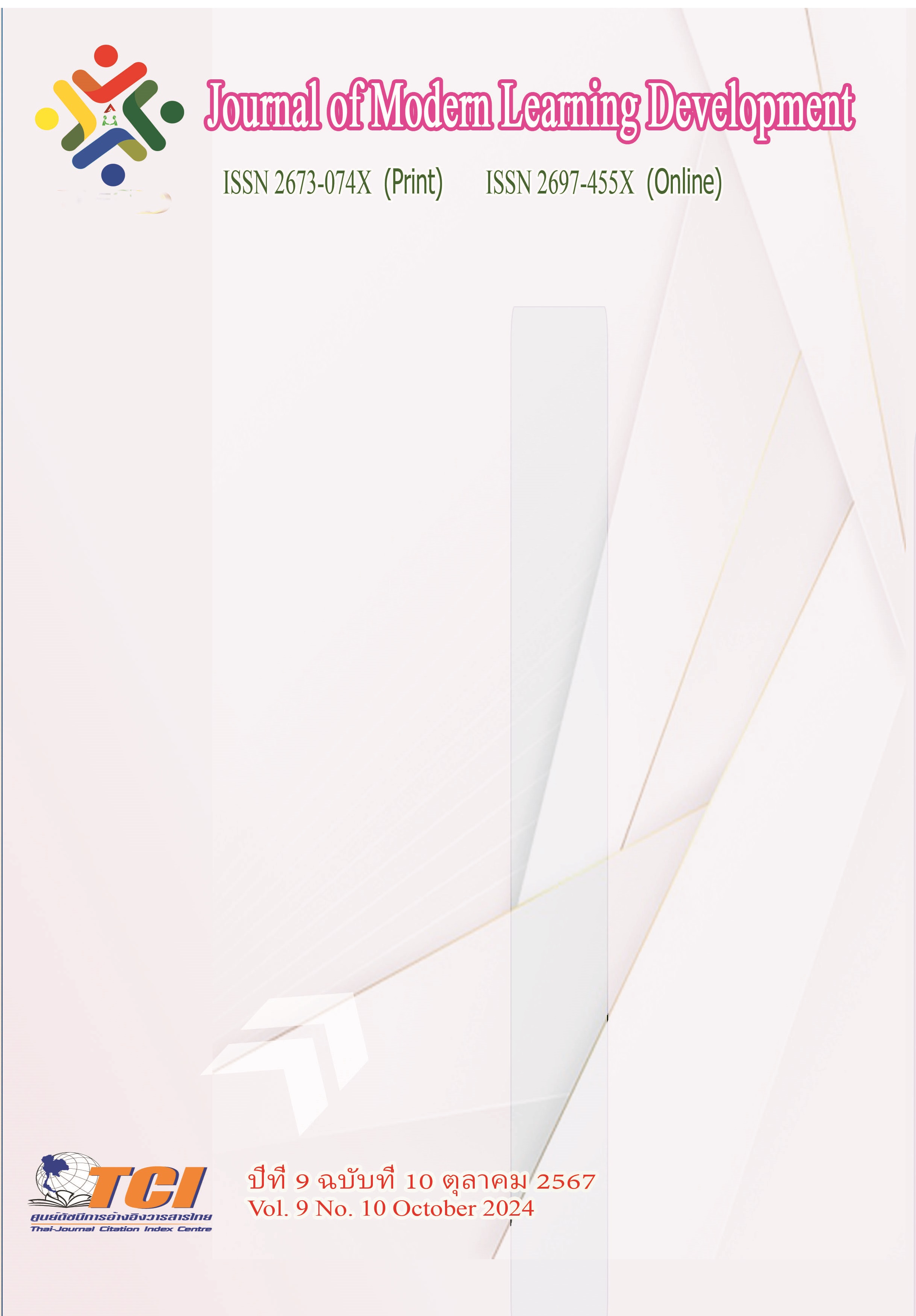The Factors Affecting Implementation Of Competency-Based Curriculum Policy In Schools Under The Office Of The Basic Education Commission
Main Article Content
Abstract
The objectives of this research were to 1) examine the implementation level of competency-based curriculum policies in schools, 2) investigate the level of factors influencing the implementation of competency-based curriculum policies in schools, 3) analyze the relationship between factors affecting the implementation of competency-based curriculum policies in schools and the actual implementation of these policies, and 4) develop a predictive equation for the implementation of competency-based curriculum policies in schools. The sample consisted of educational personnel from Tak Primary Educational Service Area Office 1 and Tak Secondary Educational Service Area Office, selected through multi-stage random sampling. The research instrument was a five-point Likert scale questionnaire comprising 84 items. Data analysis employed mean, standard deviation, Pearson's correlation coefficient, and multiple regression analysis. The findings revealed that: 1) The overall implementation of competency-based curriculum policies in schools was at the highest level (M = 4.34, S.D. = 0.42). 2) The factors influencing the implementation of competency-based curriculum policies in schools were also at the highest level overall (M = 4.35, S.D. = 0.47). 3) The relationship between factors affecting the implementation of competency-based curriculum policies and the actual implementation showed correlation coefficients ranging from .651 to .791, with statistical significance at the .01 level. 4) Factors influencing the implementation of competency-based curriculum policies in schools significantly predicted the implementation at the .05 level. The predictive factors included teaching methods (β = 0.49), administrative support and supervision (β = 0.16), and assessment and evaluation (β = 0.30).
Article Details
References
คณะกรรมการอิสระเพื่อการปฏิรูปการศึกษา. (2560). ประมวลความคิดเห็นเกี่ยวกับหลักสูตรและการจัดการเรียนการสอนจากกลุ่มผู้เกี่ยวข้องผ่านทางไลน์ กอปศ. และการประชุมรับฟังความเห็น. รายงานการประมวลความคิดเห็นจากการประชุม. จังหวัดร้อยเอ็ด: คณะทำงานวางแผนจัดทำกรอบสมรรถนะหลักผู้เรียนระดับการศึกษาขั้นพื้นฐานในคณะอนุกรรมการการจัดการเรียนการสอน.
ดวงใจ ไชยลังการ. (2558). แนวทางการบริหารจัดการหลักสูตรสถานศึกษาที่สอดคล้องกับการศึกษาในศตวรรษที่ 21: กรณีศึกษาโรงเรียนบ้านโป่งน้ำร้อน สังกัดสำนักงานเขตพื้นที่การศึกษาประถมศึกษาเชียงราย เขต 1. บัณฑิตศึกษา: มหาวิทยาลัยราชภัฏเชียงราย.
ทรงพล เทพคำ. (2557). การพัฒนาสมรรถนะของผู้บริหารสถานศึกษาสังกัดสำนักงานคณะกรรมการการศึกษาขั้นพื้นฐานในภาคเหนือตอนบน. ดุษฎีนิพนธ์ ปร.ด.เชียงราย: มหาวิทยาลัยราชภัฏเชียงราย.
พลศักดิ์ จิรไกรศิริ. (2554). ระเบียบวิธีวิจัยทางสังคมศาสตร์: เทคนิคแผนที่นำทางการวิจัย. (พิมพ์ครั้งที่ 6). กรุงเทพมหานคร: คณะรัฐศาสตร์. บัณฑิตวิทยาลัย: มหาวิทยาลัยรามคำแหง.
สมพร บัวกล่ำธนกิจ และคณะ. (2562). ทักษะครูในศตวรรษที่ 21 ที่ส่งผลต่อการเป็นชุมชนแห่งการเรียนรู้ทางวิชาชีพ ของครูผู้สอนในโรงเรียนที่สอนนักเรียนที่มีความบกพร่องทางการได้ยิน สังกัดสำนักบริหารงานการศึกษาพิเศษ. วิจัยและประเมินผลอุบลราชธานี. 8 (1), 50-59.
สุวัทนา สงวนรัตน์ และชวน ภารังกูล (2564). หลักสูตรและการเรียนการสอนฐานสมรรถนะในสถานศึกษา. วารสารสิรินธรปริทรรศน์. 22 (2), 351-364.
สำนักงานเลขาธิการสภาการศึกษา. (2567). รายงานการศึกษากระบวนการและผลการพัฒนาหลักสูตรฐานสมรรถนะ. กรุงเทพมหานคร: สกศ.
สำนักงานเลขาธิการสภาการศึกษา. (2564). แนวทางการพัฒนาสมรรถนะหลักของผู้เรียนระดับการศึกษาขั้นพื้นฐานในช่วงเปลี่ยนผ่านสู่หลักสูตรฐานสมรรถนะ. กรุงเทพมหานคร: บริษัท พริกหวานกราฟฟิค จำกัด.
สำนักงานเลขาธิการสภาการศึกษา. (2562). แนวทางการพัฒนาสมรรถนะผู้เรียน. กรุงเทพมหานคร: สกศ.
อัจศรา ประเสริฐสิน, กมลทิพย์ ศรีหาเศษ และ อารีรัตน์ ลาวน้อย. (2564). แนวทางการวัดและประเมินผลฐานสมรรถนะในศตวรรษที่ 21. วารสารการวัดผลการศึกษา มหาวิทยาลัยมหาสารคาม. 27 (2), 16-31.
Adegbemile, Oluwadare. (2011). “Principals’ Competency Needs for Effective Schools’ Administration in Nigeria”. Journal of Education and Practice. 2, 4, 17-18
Barman, A., Konwar, J., (2011). Competency Based Curriculum in Higher Education: A Necessity Grounded by Globalization. Revista Romaneasca pentru Educatie Multidimensionala. (3) 6, 7-15.
Fuchs K, (2022). The importance of competency development in higher education: Letting go of rote learning. Frontiers in Education. 7:1004876. Doi:10.3389/feduc.2022.1004876
Hair, J.F., Black, W.C., Babin, B.J. & Anderson, R.E. (2010). Multivariate Data Analysis. (7th ed.). Pearson: New York.
Hassanein O. H. S., (2021). Investigating Competency-Based Learning Implementation at the Northern Border University (NBU): A Descriptive Analytical Study. Arab World English Journal. 12 (2), 3-21.
Tichnor-Wagner, A., Allen, D., Socol, A. R., Cohen-Vogel, L., Rutledge, S. A., & Xing, Q. W. (2018). Studying Implementation within a Continuous Continuous-Improvement Process: What Happens When We Design with Adaptations in Mind? Teachers College Record. 120 (5).


